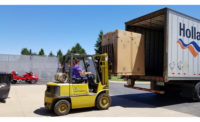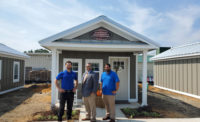A. O. Smith donates 26 water heaters to support Greenville Habitat for Humanity

A. O. Smith donated 26 heat pump water heaters to Habitat for Humanity of Greenville County in South Carolina. This donation will support the creation and growth of affordable housing by providing reliable access to hot water in the historic Nicholtown neighborhood.
Recent development in the area has led to a reduction in affordable housing. The city donated a five-acre plot of land to Habitat for Humanity Greenville County to build new housing options to preserve this historic community. Habitat Homeowners pay no more than 30% of their income at the time they buy their house. A. O. Smith’s heat pump water heater donation will help homeowners keep utility costs down throughout their homeownership.
“Because of generous donors like A. O. Smith, we will be able to ensure current and future generations of Nicholtown residents continue to have a home here,” said Nöel Brooks, director of development for Habitat for Humanity Greenville County. “A. O. Smith’s thoughtful donation of heat pump water heaters will have a tremendous impact on the long-term affordability of our homes by providing residents with utility cost savings.”
A. O. Smith chose to donate heat pump water heaters because of their cost savings and efficiency benefits. A. O. Smith heat pump water heaters can save a family of four an average of $300 per year on their electric bills — an enormous impact for regions like the southeast, where electric bills typically run high. Heat pump water heaters are 75% more efficient than traditional water heaters, using significantly less energy.
“One of our core guiding principles at A. O. Smith is to serve our communities, and we are incredibly grateful to have the opportunity to provide water heating solutions to the Greenville community,” said Bill Hosken, A. O. Smith national market development manager. “While heat pump water heaters aren’t necessarily new technology, they’ve become the most efficient solution on the market to meet and exceed homeowner’s water heating needs while keeping costs low.”
Construction in the community officially began earlier this year and the community’s first residents are expected to move into their new homes later this year. The entire community is estimated to take three years to complete, and by the end of construction, there will be more than 20 new homes for community members in need.
Looking for a reprint of this article?
From high-res PDFs to custom plaques, order your copy today!








